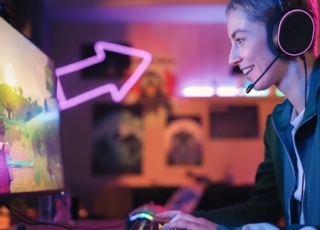Quest for the Ideal Self: Wishful Identification in Video Games
- September 13, 2024
- Marcelina Król
In this text, we continue our Psychology Behind Designing Iconic Video Game Characters series—a deep dive into the psychological aspects of video game character design, drawing not only on theoretical insights but also on our own research findings from the “Gaming Sense™ 2023: Characters” study. Here, we focus specifically on wishful identification in video games. The differences between our real selves and our in-game characters can be a powerful force for good.
We’ll discover that players frequently design or choose characters that embody their ideal selves rather than their actual selves. And bridging the gap between one’s real self and ideal self can significantly enhance game enjoyment (for more details, see: Enhanced Identification and Its Benefits).
Please note that we won’t be covering other reasons for identifying with characters that arise from different motivations. For more insights on other motivations, stay tuned for our upcoming posts. You can also explore our previous ones, e.g. here. In that post, we discussed the concept of psychological identification. This process involves associating oneself closely with other individuals, adopting their characteristics, or embracing their views.

The Legend of Zelda: Breath of the Wild / Nintendo / Source
As mentioned before, in today’s discussion, we will tackle a different kind of identification that arises not from similarity but from aspiration: wishful identification. Defined as the “desire to be like or act like the character,” wishful identification represents players’ motivation to bridge the gap between themselves and the admired characters they encounter in video games.
This form of identification plays a crucial role in how players engage with and are inspired by their favorite game characters. It leads to a deeper connection and a more immersive gaming experience. Take, for instance, The Legend of Zelda: Breath of the Wild (Nintendo). In this game, players often see Link as an embodiment of courage and adventure. By identifying with Link, players can channel their own aspirations for heroism and exploration. These goals, which might seem unattainable in the real world, are brought to life in their gaming experience. This connection encourages them to immerse themselves fully in the game’s world, striving to overcome challenges and emulate Link’s bravery.
Wishful identification is crucial as it greatly influences players’ motivation to engage with your game(!). Through escapism, players seek positive emotions and a break from daily life. The second path involves using gaming to manage troubling thoughts and emotions. It provides temporary relief from real-life challenges (for more details, see: Motivation to Play).
The key is designing video game characters that align with players’ desires and ideals. This approach can greatly deepen their connection to the game and enhance their overall experience.
Mirror, Mirror on the Wall…
As previously discussed, the mirror hypothesis suggests that players create a sense of identity coherence. They achieve this by aligning their in-game personas with traits from their real-life selves. This desire for self-consistency helps maintain a stable self-concept.
However, not all differences between our actual selves and our in-game characters are unwelcome. This is where the magic mirror hypothesis comes into play.
Games offer us something impossible in the real world—the opportunity to gaze into a mirror and see an enhanced version of ourselves. In such a mirror we can see our aspects improved, such as height, weight, facial symmetry, assertiveness, strength, or fearlessness.

Created by Ekaterina_Minaeva
People naturally seek ways to feel better about themselves, often projecting an idealized version of themselves onto characters. This creates an “ego-ideal” within the gaming reality. This process of idealization can be so powerful that players may temporarily merge their actual selves with their ideal selves embodied by the character.
This enhanced version still aligns with our perception of ourselves but includes positive adjustments. It allows us to mitigate perceived flaws and experience a sense of fulfillment by embodying our aspirations.
Isn’t it a rewarding experience to become the person we aspire to be?
Quest for the Ideal Self
Is There More to the Draenei Choice in World of Warcraft Than Meets the Eye?
Self-esteem, encompassing beliefs about oneself and emotional states, plays a crucial role in our lives and influences how individuals interact with video game characters.
According to Higgins’ self-discrepancy theory, there are three basic domains of the self: the actual self, the ideal self, and the ought self.
The core of wishful identification lies in the discrepancy between the actual self and the ideal self.
This internal conflict between one’s self-concept and their ideal self creates emotional discomfort, or even a sense of threat, and is associated with low self-esteem.
When players perceive deficiencies in themselves, they may seek to compensate for these through virtual characters, defending against threats to their self-worth. Psychological compensation involves developing strengths or capabilities in one area to offset real or imagined deficiencies in another. This process can be conscious or, if unconscious, act as a defense mechanism, shielding individuals from acknowledging their shortcomings and protecting them from feelings of unworthiness, inferiority, or inadequacy. Individuals with low self-esteem may turn to gaming to fulfill their need for self-esteem by excelling in the virtual world. Through wishful identification in video games, players can elevate their self-view, ultimately helping them feel better about themselves.
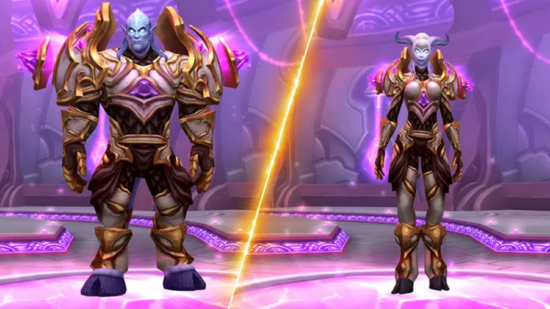
Draenei race / World of Warcraft / Blizzard Entertainment / Source
Morcos et al. conducted research on World of Warcraft (Blizzard Entertainment) players to explore the dynamics of their user-avatar relationships. They found that choosing the Draenei race in World of Warcraft is significantly linked to elevated levels of psychological compensation. This tendency is particularly common among players who have faced challenging life circumstances. They may relate to the Draenei race, which is depicted as traumatized yet resilient people.
Why Does It Matter?
Motivation to Play
Van Looy et al. developed a scale for measuring player identification in massively multiplayer online games (MMOs), revealing that wishful identification is a significant motivator. It provides players with a way to compensate for self-esteem issues they may experience in real life. This motivation unfolds in two distinct but interconnected ways:
Self-Extension Escapism
Firstly, through fantasy, or self-extension escapism, players are motivated to promote positive emotions while seeking a break from real life. This type of motivation is associated with an interest in an activity that nourishes one’s well-being. Players are drawn to adopting personas and characters that possess traits or abilities they admire or find intriguing. Wishful identification in the context of video games involves aspiring to emulate these characters, who represent idealized versions of themselves or embody qualities they aspire to possess. Whether it’s becoming a heroic warrior, a strategic mastermind, or a charismatic leader, video games provide a safe space to experiment with and fulfill these desires.

Created by klyaksun
Self-Supression Escapism
Secondly, through self-suppression escapism, players engage in gaming to prevent or suppress troublesome thoughts or emotions. This form of escapism allows players to temporarily escape their real-life challenges or perceived self-image. By exploring new identities and experiences that differ from their everyday realities, players can find distraction and relief. This allows them to focus on something beyond their current struggles or unaccepted traits.
Stepping into the shoes of a powerful or idealized character helps alleviate feelings of inadequacy, providing psychological relief and satisfaction.

Created by klyaksun
In both routes, wishful identification enhances the gaming experience by allowing players to project themselves into roles that fulfill aspirational desires or provide a break from reality.
Enhanced Identification and Its Benefits
In the previous article, we discussed the potential benefits of similarity identification. These include increased engagement and enjoyment of the game, extended in-game time, a positive perception of the game community, enhanced loyalty, and more in-game purchases.
Notably, Bessiere et al. researched how players created and perceived their characters in World of Warcraft. Their findings revealed that players frequently design or select characters that embody their ideal selves rather than their actual selves. Bridging the gap between one’s actual self and ideal self can lead to greater identification with the character, affect enjoyment and reduce self-discrepancy.
This suggests that wishful identification enhances the benefits of similarity identification, amplifying player engagement and connection with the game.
Heightened Game Enjoyment
When players see their ideal traits and aspirations embodied in their game characters, they experience a sense of alignment and satisfaction. This in consequence enhances their overall enjoyment of the game. This alignment creates a more immersive and fulfilling gaming experience, as players feel a stronger connection to their characters and the game world or even perform better in the game.
Reducing self-discrepancies can also lead to improved self-esteem and self-worth.
By achieving a closer match between their actual and ideal selves in the virtual world, players can temporarily alleviate feelings of inadequacy and boost their confidence.
This psychological benefit translates into greater overall enjoyment and a more positive attitude towards the game.
 Created by Oksana Nazarova
Created by Oksana Nazarova
Furthermore, when players identify closely with their idealized characters, they are more likely to engage deeply with the game’s narrative and challenges. This deep engagement fosters a sense of accomplishment and personal growth as players navigate the game world and overcome obstacles. The positive reinforcement from these experiences contributes to a more enjoyable and rewarding gaming experience.
How Could This Knowledge Be Applied to a Game?
Allow Customization
Customization plays a crucial role in enhancing wishful identification in video games. It allows players to personalize their characters to reflect their ideal self-image or desired identity.
Since each player’s ideal self is unique and may include a wide range of traits, offering extensive customization options is essential.
This means providing diverse choices in physical appearance, such as for example height, body type, and facial features, as well as personality traits and abilities like strength, intelligence, or charisma.
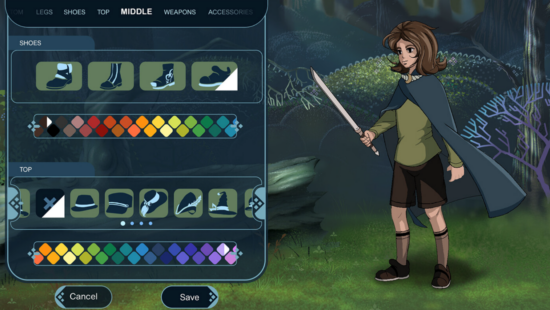
Created by Iuliana U / Source
Strive for Ideal, but Mind the Imperfections
As numerous studies have indicated, e.g., Bessiere et al., players frequently opt for characters that embody their ideal selves rather than their actual identities. Moreover, a study by Taiwanese researchers (Liao et al.) on online gamers found that players are more likely to identify with characters who are perceived as physically attractive.
However, characters that are overly perfect can risk appearing intimidating or uninteresting. Striking a balance is key—they should be admirable yet human enough to make mistakes. The Pratfall Effect supports this idea by suggesting that when highly regarded individuals make mistakes, their likability can actually increase. This happens because their perceived superiority diminishes, making them seem more relatable and human.
Therefore, incorporating believable imperfections into characters can not only humanize them but also increase their appeal to players.
Tailor the Character to Your Audience
Enhancing wishful identification in video games involves crafting narratives and challenges that resonate with players’ aspirations. Thus enabling characters to embody qualities and achievements that players admire or aspire to attain. This approach not only enhances the gaming experience but also strengthens the emotional connection between players and their avatars.
For instance, a child might deeply connect with a brave and thoughtful school-aged character, like Max Caulfield from Life is Strange (Dontnod Entertainment). However, an adult may relate more to a character dealing with complex responsibilities such as Joel Miller from The Last of Us (Naughty Dog).
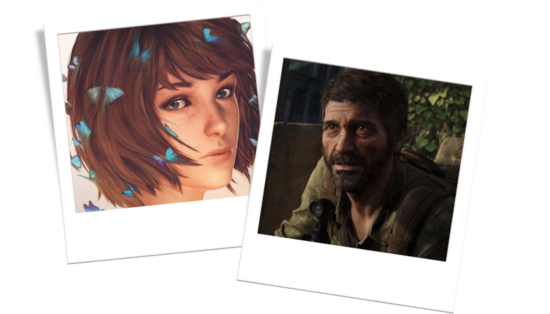
Max Caulfield / Life Is Strange / Source & Joel Miller / The Last of Us / Source
Furthermore, women and men may often identify with different character traits. Individuals from diverse social or interest groups may appreciate distinct qualities in characters as well. By tailoring character attributes to appeal to specific audiences, game developers can maximize the potential for wishful identification across a wider spectrum of players.
What Games Did It Best?
In September 2023, we initiated the “Gaming Sense™ 2023: Characters” study, surveying over a hundred mid-core and hard-core gamers from our playtester community to explore their preferences regarding game characters. One of the key inquiries in our study focused on players’ wishful identification with in-game characters, specifically asking: “To what extent would you like to resemble each of these characters in real life?” Based on the rankings from highest to lowest scores, the top three characters most frequently identified with were:
- Geralt of Rivia (The Witcher series, CD Project Red)
- Commander Shepard (Mass Effect series, BioWare)
- V (Cyberpunk 2077, CD Project Red)
With Lara Croft (Tomb Raider series, Core Design) and Nathan Drake (Uncharted series, Naughty Dog) hot on V’s heels.
Let’s take a closer look at these top 3 characters.
Geralt of Rivia (The Witcher series)
It’s intriguing that Geralt from The Witcher is seen as the most wishfully identified character, yet ranking third in terms of how similar gamers feel to him. This suggests that players admire traits in Geralt that they aspire to possess but currently do not. This blending of players’ actual and ideal selves is noteworthy and could potentially reduce the discrepancy between these two. It may also contribute to Geralt’s overall likability, as he emerged as the most favored video game character in our study.
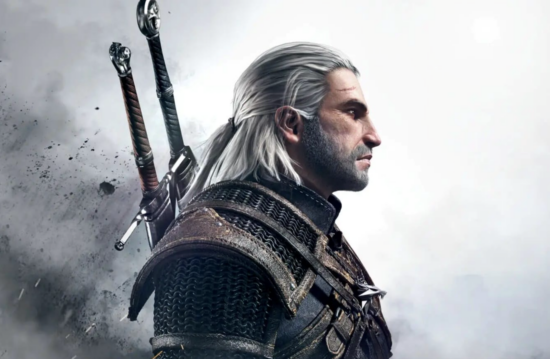
The Witcher / CD Project Red / Source
This indicates that players derive satisfaction from embodying such a heroic figure and possibly identifying with Geralt impact players’ self-perception during gameplay. By aligning themselves with Geralt, players may adopt his attributes and view themselves as more courageous, heroic, and capable. Portrayed as a skilled and formidable warrior with unique abilities, Geralt resonates deeply with players. Especially with those, who seek to embody similar traits, both in-game and potentially in their own lives. This serves as a compelling escape and provides a platform for players to explore their aspirations through the persona of Geralt.
Commander Shepard (Mass Effect series)
Commander Shepard from the Mass Effect series embodies the pinnacle of wishful identification in video game characters. Positioned between the depth of fully realized protagonists like Geralt and the customizable anonymity of others, Shepard’s appeal is significant. It lies in the player’s ability to shape them into a reflection of their own ideals and aspirations. Whether choosing Shepard’s origins, gender, and sexual orientation, or navigating moral dilemmas through paragon or renegade paths, players craft a persona that resonates with their personal values and desires.

Commander Shepard / Mass Effect / BioWare / Source
Moreover, Shepard’s role as a charismatic leader and skilled warrior further enhances this identification, allowing players to experience the thrill of commanding loyalty and making consequential decisions that impact the fate of the galaxy. The depth of relationships Shepard forms with companions and the emotional weight of their journey underscore the intimate bond players develop with this complex, flawed, yet heroic character. Ultimately, Shepard represents the embodiment of player agency and personal narrative within a richly immersive universe, making their story in Mass Effect deeply personal for gamers.
V (Cyberpunk 2077)
It’s noteworthy that players ranked V as the third character they wishfully identify with but as the first one they similarly identify with. The discrepancy between wishful and similarity identification rankings suggests an interesting dynamic. Players aspire to embody certain qualities or traits through V. At the same time, they recognize and appreciate the character’s complexity and relatability based on their own experiences and choices. Much like Commander Shepard from Mass Effect, V embodies qualities that resonate deeply with players: resilience, adaptability, and the agency to carve out their own fate in a morally complex world.
It’s also important to note that in Cyberpunk 2077, the first-person perspective (FPP) limits players’ opportunities to view their character. This contrasts with The Witcher series and Mass Effect, where the third-person perspective (TPP) allows players to see their character at all times. The constant visibility of the character in TPP or the immersive experience of adopting the character’s viewpoint in FPP can significantly impact how players connect with and identify with them. However, the factors that influence identification are much more complex than simply choosing between perspectives. This complexity makes it difficult to determine which approach is more effective.

V / Cyberpunk 2077 / CD Project Red / Source
What sets V apart is not just the sheer depth of customization options, including appearance, cybernetic augmentations, personal history, and moral inclinations. It’s also the narrative freedom to shape V’s journey. Every decision, such as forging alliances with factions or confronting ethical dilemmas, leaves an indelible mark on V’s path and relationships. Whether players envision V as a ruthless mercenary climbing the ranks of Night City’s underworld or a charismatic hacker navigating the city’s socio-political web. Regardless of their vision, the game’s narrative depth and character development create a deeply personal and engaging experience.
Takeaways
- Wishful identification allows players to embody traits they admire through video game characters.
- Players with low self-esteem use this process to boost their self-view and confidence.
- Wishful identification motivates players by offering positive emotions and an escape from real-life challenges.
- Aligning their real and ideal selves with game characters increases engagement, enjoyment, and emotional connection.
- Customization options enable players to personalize characters, reflecting their ideal self-image and driving in-game purchases.
- Characters should balance admirable traits with believable imperfections to enhance relatability and appeal.
- Tailoring character attributes and narratives to specific audiences maximizes wishful identification across diverse player groups.
These insights are part of an ongoing series exploring the psychology behind crafting memorable video game characters. Join us for more psychology knowledge that shapes our interactive adventures and could make your game stand out. Subscribe to our mailing list here. This comprehensive exploration discusses the nuanced concepts of projection, wishful identification, self-esteem, empathy, and the pivotal notion of a player’s agency. Whether a seasoned gamer or new to the digital realm, this series provides insight into the intricate psychology behind gaming experiences. It transcends the pixels on the screen, comprehensively exploring the subject.
Follow us for more! The next parts are coming soon.
*
Want to cite this article? Do it elegantly:
Król, M. (2024, September 13). Quest for the Ideal Self: Wishful Identification in Video Games. tryevidence.com. https://tryevidence.com/blog/quest-for-an-ideal-self-wishful-identification-in-video-games/




